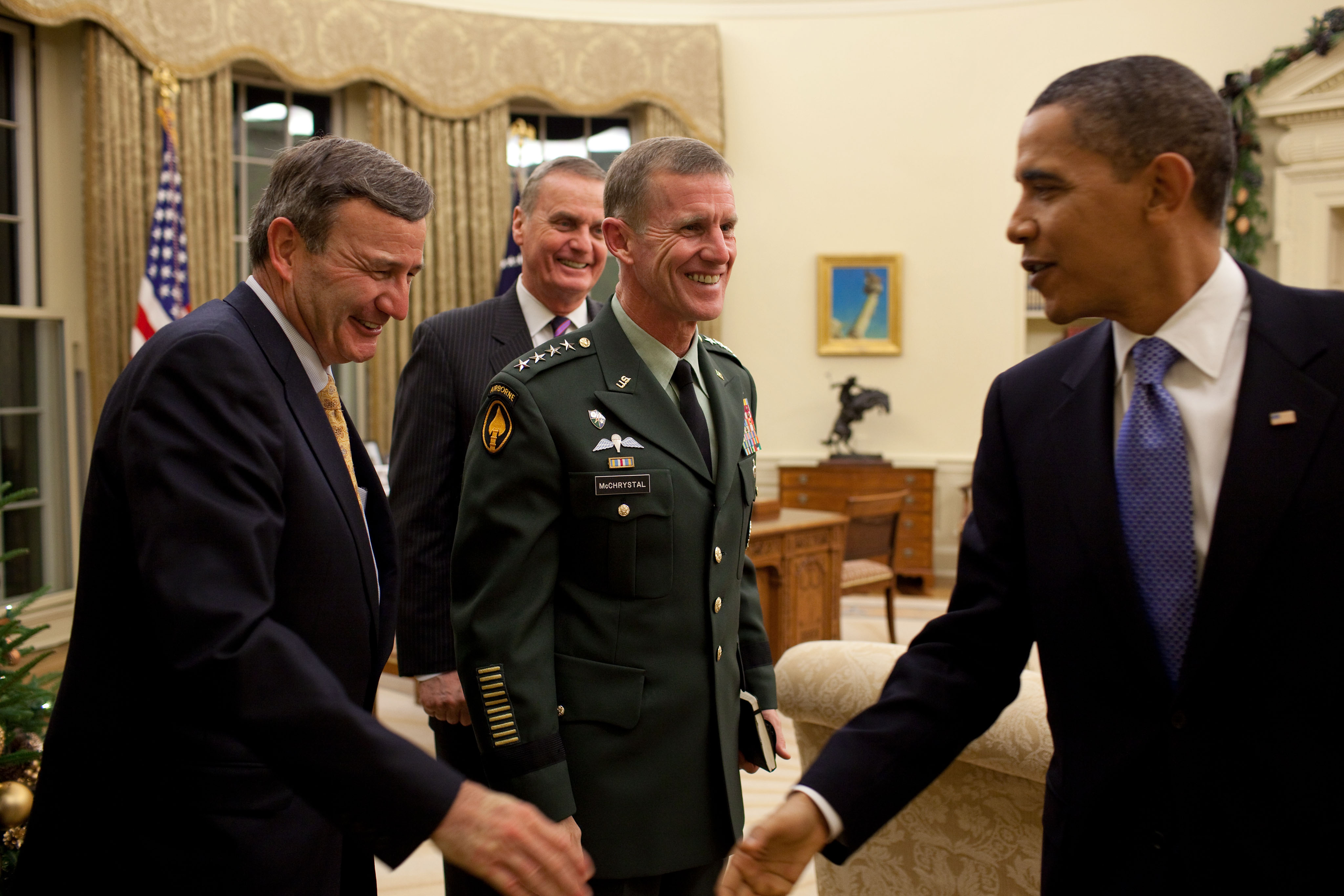General McChrystal’s Curious Reversal

General Stanley McChrystal is a genius. During the early 2000s, while running the Joint Special Operations Command in Iraq and elsewhere, McChrystal innovated a unique way of piecing together authorities from across the interagency to give his kill squads an astonishing level of responsiveness, analysis, and lethality — operating almost entirely covertly and clandestinely. Yet now he seems to be souring on the idea of the kind of warfare he innovated.
In an interview with Foreign Affairs’ Gideon Rose, posted today in part by Politico’s Dylan Beyers, McChrystal has some choice things to say about the nature of covert warfare as it’s evolved under Obama and after his retirement.
“[M]any new presidents are initially enamored with the Central Intelligence Agency, because they are offered a covert fix for a complex problem,” McChrystal tells Foreign Affairs editor Gideon Rose. “But if you go back in history, I can’t find a covert fix that solved a problem long term. There were some necessary covert actions, but there’s no “easy button” for some of these problems.”
To understand why this is a reversal of sorts from his signature innovation in counterterrorism, consider Abu Musab al-Zarqawi, the Jordanian head of Al Qaeda in Mesopotamia. As Dexter Filkins recounted in his 2009 hagiography of McChrystal (then in charge of the war in Afghanistan), McChrystal had formed his own task force, in an unprecedented collaboration between the CIA and JSOC, and eventually built up the intelligence needed to local Zarqawi and kill him in June of 2006.
Now, Zarqawi was a major force in the Iraqi insurgency, and had butchered hundreds of innocent people. He was a nasty man and no one is sorry to see him go. But the insurgency in Iraq was a complex problem with its roots in economic, political, and social issues as much as it was a simple military problem that could be solved through a decapitation strike. And in fact, the explosion of the war in Iraq after Zarqawi’s death (it got so bad at the end of 2006 that the Anbar tribes began to turn against al Qaeda, a key moment that led to the eventual reduction of violence in 2007 during the Surge) suggests that his death was not actually enough on its own to do anything to solve the complex foundations of political violence in Iraq. Iraq’s continuing violence to this day shows how complex the problem is.
And in fact, in his own post-retirement writing, McChrystal has defended and promoted his methods for innovating covert and clandestine warfare to go after terrorists and insurgents. He even tried to take partial credit for the bin Laden raid, saying such secret, kinetic operations were his innovation.
And all of that is fine. But in a very real way McChrystal is arguing against a bit of a straw man. This is not the first time he’s expressed his skepticism of kill missions publicly, it is also undeniable that McChrystal was a primary innovator in the very tactics he now decries as too simple and not geared toward long-term success.
Why is McChrystal doing this? He isn’t wrong in his criticism. Few really argue that drone strikes and other forms of covert warfare are meant to actually solve the long term problems of state failure, hollow states, and roiling insurgencies spilling over into regional or even global problems. At best, these methods are meant either to degrade specific organizations (al Qaeda) or to manage the problem long enough for the host government to figure out its own solution (assuming the Yemen strategy pans out).
But to see the man who brilliantly reshaped the interagency bureaucracy to enable quick, highly-sourced kill missions then, only upon retirement, decry them as ineffective and possibly counterproductive… well, that’s a bit jarring, to say the least. It brings to mind General Ricardo Sanchez, the Army General who led forces in Iraq in 2003-2004. His tenure there was, to be blunt, a complete disaster, including his endorsement of the torture of detainees at Abu Ghraib. His command was so bad for the troops and for Iraq that he was eventually forced to retire as a 3-star general, rather than a 4-star. And in his anger over such a snub, he wrote a memoir blasting the Bush Administration for how badly it mishandled the early occupation through L. Paul Bremer.
The thing is, during his command and the many years after, Sanchez was silent about this supposed political meddling and catastrophe. He tried to ride his career as high as he could, and when it stalled out he stomped his feet and blamed others for what unfolded in Iraq (and tried to parlay that into a run for the Senate, no less).
McChrystal is not doing anything as loathsome; his criticism of drone strikes are not as cynically self-serving as Sanchez’s criticism of the war in Iraq. But the mindset is the same. McChrystal had proven he could shift the interagency in surprising ways when he was on the inside, and he used that to create a method of warfare he thought was effective at addressing a problem. It’s perfectly okay for him to realize now, upon reflection, that it wasn’t a very good way of doing that.
But at the very least, McChrystal could account for his own role in creating the system he now rejects. He played a huge role in creating the beast; to now complain it’s not very useful borders on hypocrisy. And of course, he couldn’t possibly have a bone to pick with President Obama, either.